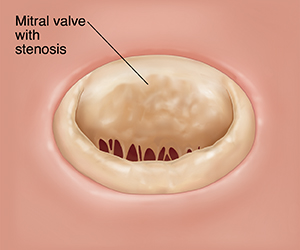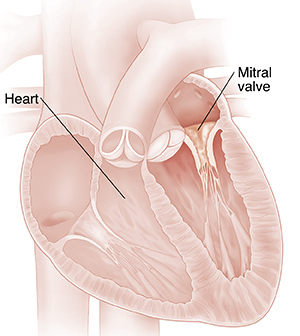Heart Valve Problems: Mitral Valve Stenosis
Mitral stenosis means the mitral valve stiffens and does not open all the way. Blood must move through a smaller opening. In severe cases, fluid can build up in the lungs, leading to coughing and breathing problems. Problems with the mitral valve can also cause a fast or irregular heartbeat (palpitations). Over time, mitral stenosis may slowly get worse.
Symptoms of mitral valve stenosis
Symptoms may include:
Possible causes
Most cases of mitral stenosis are caused by rheumatic fever. This illness can lead to an inflammation that damages the heart valves. Although pregnancy does not cause mitral stenosis, a woman may first develop symptoms of mitral stenosis during pregnancy. This is because the amount of blood her heart has to pump increases during pregnancy.
|

Open mitral valve with stenosis (viewed from above).
|

|
Treating mitral valve stenosis
If you do not have symptoms, you usually will not need treatment. If symptoms occur, your doctor may prescribe medicines to help ease them. If the stenosis is severe, a procedure called balloon valvuloplasty can stretch the opening of the valve. If a valvuloplasty can't open the valve, surgery can be done to replace the valve. A tissue valve or a mechanical valve may be used.
© 2000-2019 The StayWell Company, LLC. 800 Township Line Road, Yardley, PA 19067. All rights reserved. This information is not intended as a substitute for professional medical care. Always follow your healthcare professional's instructions. This information has been modified by your health care provider with permission from the publisher.